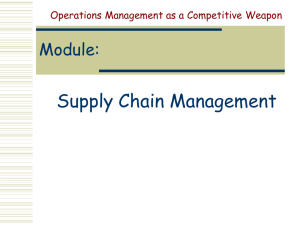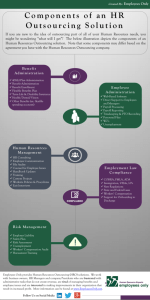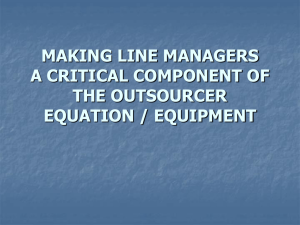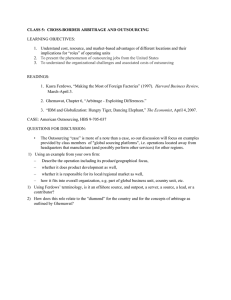Transferring business processes: (Business Process) Outsourcing explained What is outsourcing? Definition
advertisement
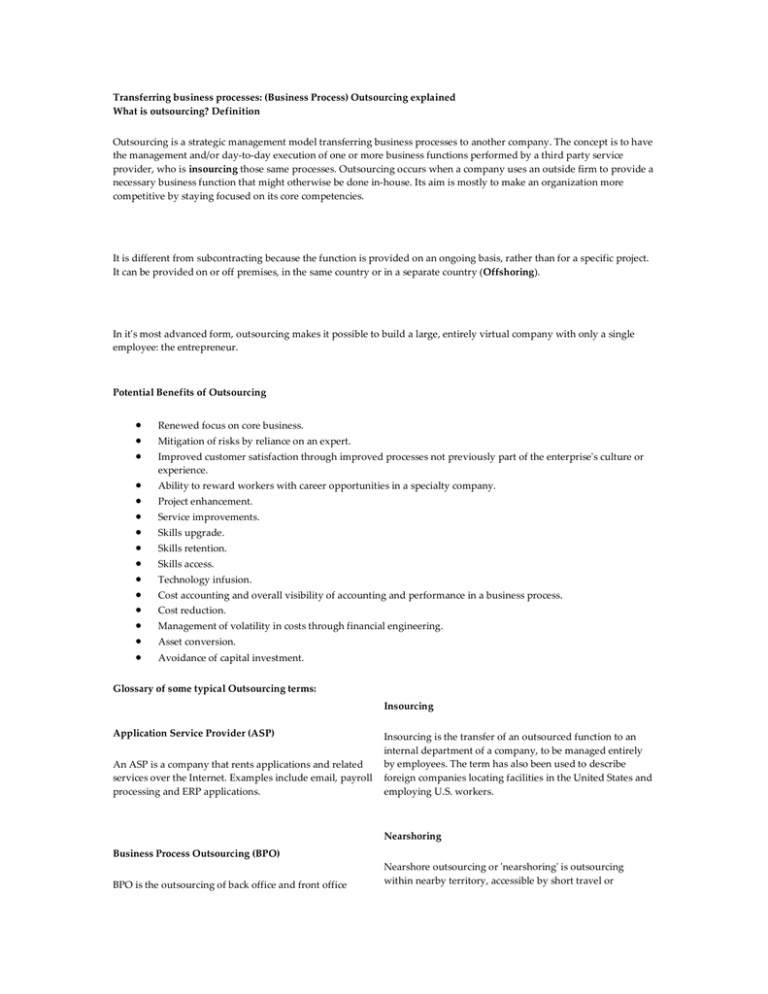
Transferring business processes: (Business Process) Outsourcing explained What is outsourcing? Definition Outsourcing is a strategic management model transferring business processes to another company. The concept is to have the management and/or day-to-day execution of one or more business functions performed by a third party service provider, who is insourcing those same processes. Outsourcing occurs when a company uses an outside firm to provide a necessary business function that might otherwise be done in-house. Its aim is mostly to make an organization more competitive by staying focused on its core competencies. It is different from subcontracting because the function is provided on an ongoing basis, rather than for a specific project. It can be provided on or off premises, in the same country or in a separate country (Offshoring). In it's most advanced form, outsourcing makes it possible to build a large, entirely virtual company with only a single employee: the entrepreneur. Potential Benefits of Outsourcing • • • Renewed focus on core business. • • • • • • • • • • • • Ability to reward workers with career opportunities in a specialty company. Mitigation of risks by reliance on an expert. Improved customer satisfaction through improved processes not previously part of the enterprise's culture or experience. Project enhancement. Service improvements. Skills upgrade. Skills retention. Skills access. Technology infusion. Cost accounting and overall visibility of accounting and performance in a business process. Cost reduction. Management of volatility in costs through financial engineering. Asset conversion. Avoidance of capital investment. Glossary of some typical Outsourcing terms: Insourcing Application Service Provider (ASP) An ASP is a company that rents applications and related services over the Internet. Examples include email, payroll processing and ERP applications. Insourcing is the transfer of an outsourced function to an internal department of a company, to be managed entirely by employees. The term has also been used to describe foreign companies locating facilities in the United States and employing U.S. workers. Nearshoring Business Process Outsourcing (BPO) BPO is the outsourcing of back office and front office Nearshore outsourcing or 'nearshoring' is outsourcing within nearby territory, accessible by short travel or functions typically performed by white collar and clerical workers. Examples include accounting, human resources and medical coding and transcription. telephone in the same or neighboring time zone. Offshoring Competitive Insourcing Offshore outsourcing or 'offshoring' is outsourcing overseas or in a separate country. Outsourcing to a contiguous Competitive insourcing is a process whereby internal country may be considered nearshore outsourcing (see employees engage in bidding to compete with competitive, above). third-party bidders for a defined scope of work. See also insourcing. Service Level Agreement (or SLA) Contract Manufacturing An SLA is a contract or addendum to a contract that defines the type, value and conditions of the outsourcing services to Contract manufacturing is the outsourcing of a be provided. Typically, SLAs address quality of service manufacturing job to an onshore or offshore third-party with conditions, such as response time, availability, speed, et the necessary infrastructure and know how to perform the cetera. job. Shared Services Co-Sourcing or Cosourcing Cosourcing is where a business function is performed by both internal staff and external resources, such as consultants or outsourcing vendors, with specialized knowledge of the business function. Shared services is the outsourcing of a business function within an enterprise to a highly skilled internal department or group. For example, the purchasing department at one plant may provide purchasing services to all other plants within a given manufacturing company. Shared services may also be provided to third parties. Facilities Management An outsourcing solution in which the customer entrusts to an external services provider the responsibility for operations and maintenance of one or more facilities. Compare with Outsourcing: Business Process Reengineering | Co-Creation | Value Stream Mapping | Value Chain | Core Competence | Bricks and Clicks | Delta Model | Management buy-out | M&A | SWOT analysis | Benchmarking Return to Management Hub: Change / Organization | Finance / Investing | Human Resources | Program / Project Management | Strategy | Supply Chain / Quality More on Management <img> <img>

